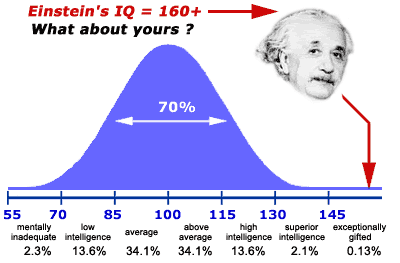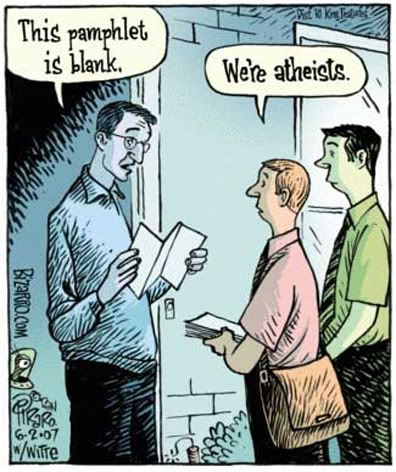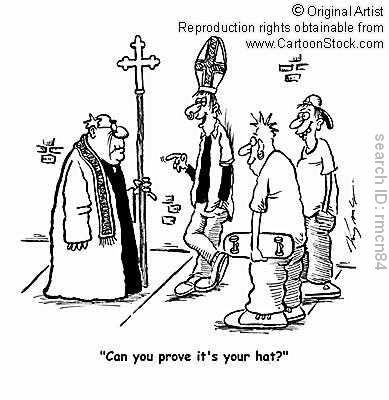 Einstein believed in God.
Einstein believed in God.
There's a huge lie being propagated about the net that religious people have lower IQ's than atheists. This is one of the major points being made the site that we looked at last time, the Psychology Today blog tended by Satoshi Kanazawa. That article and study are cited everywhere. They are repeated on every atheist blog and website ad infinitum, not always approvingly.I promised I would deal with the IQ scam and I shall. The
Study sited by Kanasawa is the
Lynn, Harvey, Nyborg study. Nyborg is the main the figure. There are actually
two studies by this same group. One of them deals with data gathered by department of labor (
National Longitudinal surveys) the other study takes the data an analyzes it country by country. So one is about do religious children have higher IQ's version atheist (of course they say "no!"). The other one (linked above) is about do religoius countries have more smart people than atheist countries (of cousre they say not, atheist countries--wherever those are--have more smart people). These studies are ubiquitous. From this one set of data that the alleged researchers did not compile the vast army of atheists are willing to pat themselves on the back and assume they are smarter than people who believe in God.
The fact that the group did not collect their own data but used department of labor statistics is a problem because they data was not gathered from a study designed to measure or compare the intelligence of believers vs. non believers. There is no study design there. Before turning to that, however, it would be more helpful to examine the old data. Before the Nyborg study there was an atheist website that tried to prove the same thing, it got a great deal of attention, until I destroyed it. I proved that they lied about one of the studies.
The original data was from "Free Inquiry" Spring of 1986. This forms the basis of the whole IQ scam. It's been floating around for years and thousands of atheists have been brain washed by its' lie. It is a lie as I am about to demonstrate. It's been floating around in the form of several websites that take their ques from this one. The sites its on is called '
the liberalism resurgent, by Steve Kangas." That's the site I linked to for my rebuttal page way back years ago when I first put it up. All he does is list a bunch of studies that supposedly show that atheists have higher IQs than religious people. These were all done with school children, so there's no way to know how many of the same kinds in the study who said they were atheists became religious in adulthood.It's an easy guess that many did because that happens a lot so it would be important to know that. Moreover, notice he places the Hoge study
(#15) Hastings and Hoge, 1967, 1974 (actually two studies) in the category of those that back his view. But I received literature form Dr. Francis a researcher in UK university who did several studies on the issue, this literature showed that
Hoge showed no correlation between intelligence and religious belief, which contradicts the study and indicates that Kangas either lied or made a blunder. One can see from the rest of the literature that the thesis Kangas is working on is totally ravaged by the facts from just listing the studies that Francis sent in his study:
What follows is reproduction of my page:
The site also presents 17 studies giving the impression that all 17 support the thesis that more successful and higher scoring students tend to be non-believing students, while religious students score lower. Then they actually argue that this is a reliable guide to which world view is correct! (Appeal to success, similar to appeal to authority!)
But if we divide them into categories according to what they actually say, we see a much different picture. The first number is the counting number, to show how many are in each section, the number in parenthesis is the actual number given in the list on the website.
Studies too Veg to Draw a Conclusion
1.
(#7) Donald Gragg, 1942
Reported an inverse correlation between 100 ACE freshman test scores and Thurstone "reality of god" scores.
2.
(#9) Michael Argyle, 1958
Concluded that "although intelligent children grasp religious concepts earlier, they are also the first to doubt the truth of religion, and intelligent students are much less likely to accept orthodox beliefs."
3.
(#14) Robert Wuthnow, 1978
Of 532 students, 37 percent of Christians, 58 percent of apostates, and 53 percent of non-religious scored above average on SATs.[but wait, there's no comparison of the scores, so even though only 38% of Christians as opposed to 58% of apostates scored above average, what if the Christians scored way above average and the apostates only slightly?]
4.
(#16) Norman Poythress, 1975
Mean SATs for strongly anti religious (1148), moderately anti-religious (1119), slightly anti religious (1108), and religious (1022). [From what sample group? All of them? Doesn't say!]
| The few studies that actually seem to support the conclusion |
1. (#1.)
Thomas Howells, 1927
Study of 461 students showed religiously conservative students "are, in general, relatively inferior in intellectual ability."
Doesn't show how conclusion was arrived at 2 (#2.)
Hilding Carlsojn, 1933
Study of 215 students showed that "there is a tendency for the more intelligent undergraduate to be sympathetic towards atheism."
Doesn't really say "sympathetic" means self-identified as atheists, nor does it show how he arrived at his conclusion.
3 (3.)
Abraham Franzblau, 1934
Confirming Howells and Carlson, tested 354 Jewish children, aged 10-16. Found a negative correlation between religiosity and IQ as measured by the Terman intelligence test.
4 (11.)
Young, Dustin and Holtzman, 1966
Average religiosity decreased as GPA rose.8. Brown and Love, 1951 At the University of Denver, tested 613 male and female students. The mean test scores of non-believers was 119 points, and for believers it was 100. The non-believers ranked in the 80th percentile, and believers in the 50th. Their findings "strongly corroborate those of Howells."
5 (13.)
C. Plant and E. Minium, 1967
The more intelligent students were less religious, both before entering college and after 2 years of college.[Doesn't say how they determined this]The interesting thing about this is, there are actually more studies that have counter findings than there are supporting the thesis, which give enough information to be clear about how they obtained it (with four that are too vague about this to consider).
6.
(#4) Thomas Symington, 1935
Tested 400 young people in colleges and church groups. He reported, "There is a constant positive relation in all the groups between liberal religious thinking and mental ability There is also a constant positive relation between liberal scores and intelligenceŠ"
Note: This guy with the website habitually assumes that liberal religious views are not religious views and counts liberal religious thinkers as unbelievers, which is absurd and dishonest; he does it with this study and on page 2, you will see he does it a lot.
| Studies presented that actually count as evidence counter to the claim. |
1.
(#5) Vernon Jones, 1938
Tested 381 students, concluding "a slight tendency for intelligence and liberal attitudes to go together." [This doesn't say anything about religious belief or lack thereof. He's equating "liberal" with non-religious.]
2.
(#6) A. R. Gilliland, 1940
At variance with all other studies, found "little or no relationship between intelligence and attitude toward god."[Obviously its not really at variance with "all" others since I just listed several others that don’t make those findings, and little or no relationship counts as negative evidence.]
3.(#10) Jeffrey Hadden, 1963
Found no correlation between intelligence and grades. This was an anomalous finding, since GPA corresponds closely with intelligence. Other factors may have influenced the results at the University of Wisconsin. [counts against his assumption that grades = intelligence so he can't measure intelligence through the studies that make that assumption. Also, what does he site in the face of this one to prove that graces indicate intelligence? And what about motivations?] (I suggest a sentence such as [This study discounts his assumption…)
4.
(#12) James Trent, 1967
Polled 1400 college seniors. Found little difference, but high-ability students in his sample group were over-represented.[so they polled them? What did they use as a measure of intelligence? Doesn't say. But it does say they found no relation, or little, and virtually admit the sample is worthless so this counts as negative or at best as inconclusive.]
5.
(#15) Hastings and Hoge, 1967, 1974
Polled 200 college students and found no significant correlations.[negative correlation is clearly negative evidence, there is no relation]
Notice: the Francis study lists Hoge under the category of those that show no correlation between intelligence and religion, but that website lists it as positive to their thesis.
6.
(#17) Wiebe and Fleck, 1980
Studied 158 male and female Canadian university students. They reported "nonreligious S's tended to be strongly intelligent" and "more intelligent than religious S's."[dosen't hint at how this was determined]
| Studies not on the web site (listed by Francis) which found either no corrollation or postive corrollation |
1)
Feather (1964)Critical reasoning test and religious attitudes scale to 165 male psychology students. "He found no significant relationship between these measures."
2)
Feather (1967) replicated in among 40 students.
3)
Young et al., (1066) 32 item scale by Holtzman and young (66) five percent random sample of native born full time students at University of Texas, "where they found no significant relationship between mean attitude scores and cumulative grade points."
4)
Dodrill (1976) 20 Christians, 24 non Christians, "This study found no significant differences between the two groups using the Westchester Adult Intelligence scale."
5)
Francis (1979)using frequency of prayer and church attendance) 2272 school children between 9-11,"found no relationship between school assigned IQ's and religious behavior after controlling for paternal social class."
6)
Fracis'('86 replication) findings replicated in second study among 6955 students.
7)
Francis ('98) the study these studies are sited in, using sample of 711 students, the Francis Religious attitude Scale and standard IQ tests Francis again found no correlation.
1)
Pratt (1937) among 3040 students at regional state college, taking denominational affiliation as sign of religiosity, "found that non-affiliates recorded lower mean scores on the American council Examination than any students affiliated to any denominational group."
2)
Rummell (1934) also using denominational affiliation 1194 students at University of Missouri. "He found that non-affiliates recorded lower mean scores on his scholastic index compared with Methodists and Episcopalians."
3)
Corey (1940) 234 Freshmen University of Wisconsin positive correlation between scores on the Ohio State Psychological Examination and the Thurstone scale of attitude toward God. "'The more intelligent were more favorably inclined toward God.'"
4)
Kosa and Schomer (1961) 362 students at a Catholic undergraduate college: taking participation in campus religious activities as scale of religious attitude "intensive participants recorded significantly higher scores than non-participates on OSU aptitude Test and OSR reading comprehension test.
6 studies find negative correlation.
17 find positive or no correlation.
[
Leslie J. Francis, University of Wales Lampiter, "The Relationship Between Intelligence and Religiosity Among 15-16 year olds,"
Mental Health, Religion & Culture, Volume 1, Number 2, 1998]
Counting all the studies together, both those presented as negative and those presented by Francis which are either neutral or positive, 17 to 6 in favor of the thesis being unproven. But more importantly, Hoge was listed wrongly, so what else can we not trust about those studies? Moreover, the sample size for the positive or neutral correlations are much larger in many instances. None of the negative sample sizes come close.
negatives: 1448, 532, 354, 315, 613, 400 (not all listed)
Largest positive or neutral:381, 1400, 200, 158, 165, 44, 2272, 711, 3040, 1194, 362.
The Positive or neutral studies would tend to be the better studies since they have more with larger samples sizes, and Francis controls for the Freudian bias which taints all the negative studies. Poythres (1975) sets the differences within the context of psychoanalytic theory.(Francis 188). We also notice that the negative studies tend to be older, ranging mainly form the 1930s to 1968, while all of the positive or neutral studies tend to be set in the 1960s to the 80s and one as recent as 98. This is explained by Hoge in terms of increasing socioeconomic status and greater exposure of religious people to new ideas at a younger age.
"The long discussed shock of freshmen encountering Atheistic professors at college and the transition problems from childhood beliefs to intellectually defensible beliefs have been reduced in recent years. Today the shock comes earlier and with less force than in decades past."(in Francis 188). (This capitalization is a matter of mild controversy. If Atheism is a religion, then it is capitalized as Buddhist, Moslems and Christianity are.)
We really have to ask ourselves, in studying students, especially freshmen in college, they are getting kids when they are the most rebellious? For those in early college they are going off to school for the first time, away from home, no longer under the strictures of Mom and Dad, they tend to rebel against Mom and Dad. It's a time of experimentation. Naturally we should expect to find that bright kids are experimenters, that they are willing to try new ideas. Secondly, how long did these kids remain unbelieving? How many are no in middle or even old age having had a life time of religious commitment gained in graduate school or beyond? Not a single one of these studies gave any indication of being longitudinal! That is extremely important, because it makes sense that students in late high school and early college will be rebellious and more inclined to question their upbringing. How many of them were actually still atheists 20 or 30 years latter? We don't know and not a single one of the studies even tried to find out. For all we know the vast majority of them might have become believers in 10 years out of college! In fact we have good reason to suspect that this is the case; after they got married and started raising families, they probably began to believe again, and this seems to be the pattern. That conclusion would also be supported by the quotation form Hoge above, the shock of leaving home, encountering atheist professors, dealing for the first time with serious challenge of new ideas could for time lead the unwary into doubt, but latter they recover.
In part 2 I will deal with the current study, Nyborg in a couple of days.





